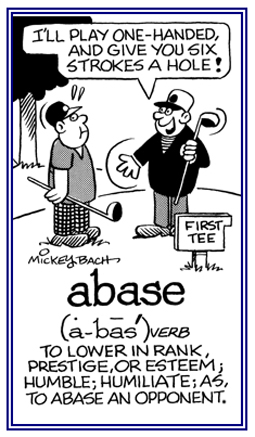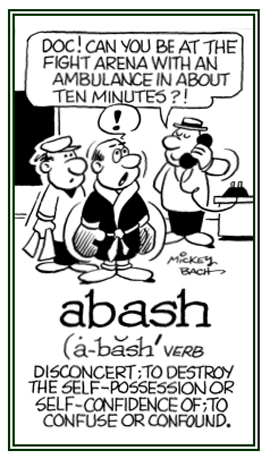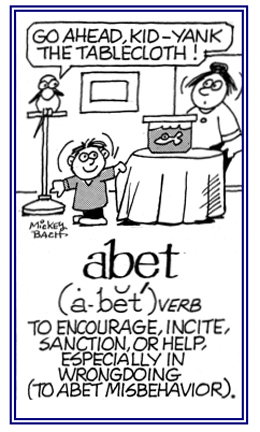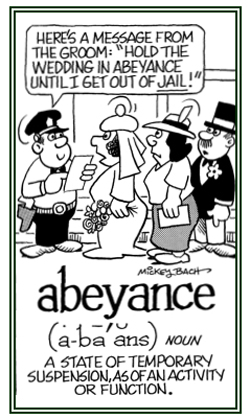English Words in Action, Group A
(a variety of English words which have developed through history and are currently used in our modern age)
Simply click on this banner (or the following link) and you will be on your way to stimulate your brain for greater word comprehension with quizzes based on some of the words in this unit.
Abandon and its past tense form, abandoned, are words of wide significance, indicating the complete giving up or withdrawal from people or things of any kind.
To abandon implies a previous association with responsibility for or control of something; so, a person may abandon or forsake, a house, friends, or even a family.
2. To desert, to give up, or to leave: The captain shouted to the crew, "Abandon ship!"3. To discontinue, to quit, or to stop trying: The scientist abandoned his research because of a lack of funds.
4. Etymology: from the Old French phrase laisser a bandon, "to relinquish to another person's control".
2. A reference to, enthusiasm, being wild, or being uninhibited: The Gypsies danced with abandoned excitement.
3. Depraved, sinful, or wanton: Otto, the excessive pleasure-seeker, led an abandoned life.
2. To bring down to size, to humiliate, or to disgrace: Emily's political opponent was abasing her perceived successful years in office.
3. To behave in such a way as to make oneself seem less deserving of respect: The two political candidates were insulting and abasing each other on TV, in newspapers, and on the radio.
4. Etymology: from Late Latin bassus, "low".


Go to this Word A Day Revisited Index
so you can see more of Mickey Bach's cartoons.
2. Etymology: from Latin ex-, "out of" + baer "to gape, to be open"; from batare "to yawn, to gape".


Go to this Word A Day Revisited Index
so you can see more of Mickey Bach's cartoons.
Matilda's abashed reaction was obvious when she was asked about what kind of job she had.
2. Etymology: Bah! was an exclamation of astonishment in Old French. The English word abashed comes from Old French esbahir, "to get a bah out of someone" or "expressing impatient rejection or contempt".2. To curtail, to trim, or to shorten: Since time was short, Maurice abbreviated his visit with his friends.
3. Etymology: the brev- in abbreviate comes from the Latin brevis, "short", which is also the source of brief; so, naturally, abbreviate means "to make briefer, to make shorter" by combining or omitting something; for example, changing "dozen" to "doz." and "quart" to "qt.".
Some abbreviation of Gary's speech was necessary because he didn't have enough time to deliver all of it.
2. Letters which are used to represent shortened forms or references to words or phrases: U.S.A., FBI, Calif., and Dr. are just a few abbreviations or shortened forms of words or phrases to represent the full terms.3. Letters that are shortened references for a word or a phrase and which themselves are pronounceable as words: NATO, NASA, and UNICEF are types of abbreviations called acronyms; or abbreviations that may be pronounced as a word rather than just as a series of letters.
Remember: an abbreviation is pronounced as separate letters (U.S.A., FBI) while an acronym may be pronounced as a word (NATO, NASA).
4. Etymology: from Middle French abréviation, from Late Latin abbreviationem, abbreviatio, from abbreviare "to make brief" from Latin ad, "to" + breviare "to shorten" from brevis "short, low, little, shallow".Abducting anyone is against the law and is severely punishable.
2. Etymology: from Latin abductionem, abductio,"a leading away"; from abducere, "to lead away, to take away" (often by force), from ab-, "away" + ducere, "to lead".
2. Oddity; abnormalities; incongruity: The new rules were confusing and full of aberrations.
3. Quirk, eccentricity, peculiarity; Emanuel's only aberration was an occasional lapse of memory.
3. A deviation from the norm: The heat this summer was definitely an aberration from what people expected.
The extreme wide-spread cold weather with snow and ice that some areas had this winter was an aberration.
4. Etymology: from Latin aberrationem, aberratio. "a wandering, a straying"; from the stem of aberrare. "to wander out of the way, to lose the way, to go astray"; from ab-, "away" + errare, "to wander".2. To assist someone to do something; especially, something illegal: The robber was abetted by his brother who drove the get-a-way car away from the scene of the crime.
3. To assist someone to commit a crime, including planning the crime and helping the person to escape from the police, if it is necessary: It was amazing that, even though the head of the criminal gang was in jail, he was still able to abet his fellow conspirators in planning the bank robbery.
4. Etymology: from Old French abeter, "to incite, to tease," or "to bait another person".
Abet comes from the baiting of wild animals or the ancient sport of bear baiting, and the English language has now taken this violent word meaning and applied it to people rather than to animals.
This term goes far back to an old Teutonic origin that conjures up a picture of hardy men going to the chase with their packs of hunting dogs. Our English verb bite appeared long ago in a Low German derivative betan, meaning "to cause to bite, to make bite", as, to make dogs bite the bear, and so to send them out to hunt the bear.
Icelandic beita meant "to feed, to make bite", and also "to hunt" with dogs. The French adopted both the sport and the Teutonic name for it, making the Old French verb beter, meaning "to bait" a bear, and abeter, "to excite, to incite", which we have taken into English as abet. No longer applied to the hunt, it now means to encourage or to incite people, usually in an evil enterprise.

Go to this Word A Day Revisited Index
so you can see more of Mickey Bach's cartoons.
Santos was an abetter with the thief who was robbing the bank.
2. Etymology: from about 1374 (implied in abetting), from Old French abeter, "to bait, to harass with dogs"; literally, "to cause to bite" from à, "to" + beter "to bait", from a Germanic source, perhaps Low Franconian betan, "incite" or Old Norse beita, "cause to bite".Legally, abet is usually applied to aiding in the commission of a crime. In relation to the charge of "aiding and abetting", the term includes knowledge of the perpetrator's wrongful purpose, and encouragement, promotion or counsel of another person in the commission of the criminal offense.
An abettor is legally considered to be an instigator, or "setter on"; someone who promotes or procures a crime to be committed.
2. A condition in which legal ownership of an estate has not been established: The uncertain abeyance of her father’s property caused a great deal of anxiety for Dorothy; so, the decision of the judge is expected to be important.
3. Etymology: in its beginning, abeyance meant "waiting with gaping (open) mouth". Something "held in abeyance" may cause some anxiety or impatience, but it hardly suggests "open-mouthed expectancy"; nevertheless, that was originally the literal meaning for the word.
Abeyance came from the Late Latin badare, "to gape". The word passed into the Old French spelling baer, beer, "to gape, to look with open mouth, to expect". From this was derived the old French abeance, literally, "a gaping at", but used metaphorically to express "expectation" or "longing".
This has resulted in the English abeyance, a legal term used about rights which were suspended, "held in abeyance", awaiting a proper claimant. Its meaning, however, has broadened in general use to indicate any kind of suspension or temporary suppression."


Go to this Word A Day Revisited Index
so you can see more of Mickey Bach's cartoons.
2. A term that indicates that legal ownership of an estate has not been established: The abeyant nature of the settlement of Morgan's property left his daughter feeling insecure.
3. Etymology: in English, abeyance is a legal term used regarding rights which were suspended, "held in abeyance", awaiting a proper claimant. Its meaning, however, has broadened in general use to indicate any kind of suspension or temporary suppression.
Additional word information
When anything is abeyant it is referring to a state of inaction, that the matter, whatever it was before, is now dormant; although some action might be expected to occur eventually. It was that expectancy that gave us the word, because it came as a law term, from the Norman Conquest, from the Old French abeance "a state of expectancy".
The term referred; especially, to the condition of a property or title while, after the death of the former possessor, often by foul means in those days, his successor could be determined from among various claimants.
The Old French word was derived from the verb beer (modern bayer), "to gape, to expect", perhaps because of the gaping expectancy with which the settlement of an estate was awaited either by the rightful heir or by a hopeful usurper, none too certain that his claim would pass scrutiny.
2. To linger, to stay, or to hang around: When Helen was at the hospital, she asked Micah to abide with her for just a little while longer.
Links to all of the groups of English words in action, Groups A to Z.
You may see the bibliographic list of sources of information for these words in action.

